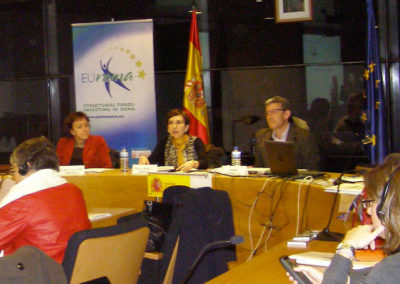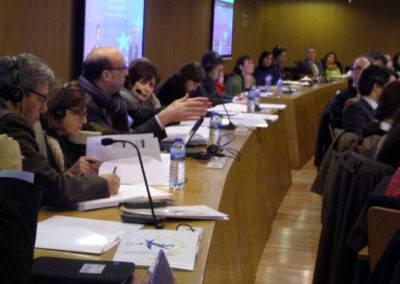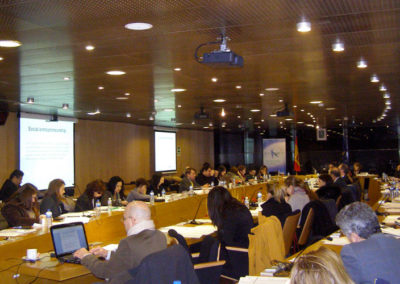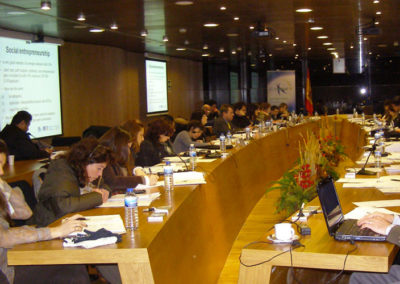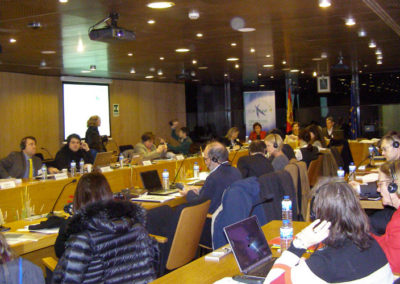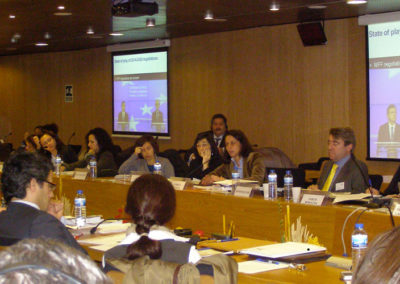The EURoma Network held its autumn meeting on the 13th and 14th of December in Madrid. Hosted by the Spanish partners, the meeting gathered around 60 participants, including Structural Funds Managing Authorities and public bodies in charge of Roma policies from 16 European countries participating at the meeting, as well as European Commissions representatives and other relevant stakeholders, plus the EURoma Technical Secretariat.
The second meeting of the year organized in Madrid (Spain) brought together 63 participants and the two-day debate mainly focused on the integrated approach of projects targeting the Roma population as well as the combination of EU funds (mainly ESF and ERDF) for the social inclusion of this population. The agenda looked over these issues in order to support members of the network to achieve a higher impact on the interventions for the social inclusion of the Roma community in the current programming period but also in order to anticipate the new programming period of the funds (2014-2020). Other key issues discussed followed up on the current implementation of the National Roma Integration Strategies and the contribution of Structural Funds to these national strategies.
Participants included Network partners – Structural Funds Managing Authorities and the bodies in charge of Roma policies- from 12 EU Member States, European Commissions representatives (DG Employment, Social Affairs and Inclusion Opportunities and DG Regional Policy) as well as the EURoma Technical Secretariat (Fundación Secretariado Gitano). Representatives from a number of initiatives building on their knowledge and experience that could provide relevant information were invited to join the meeting as well: The ETF, The EEA and Norway Grants Financial Mechanism, UNDP, The North-West Regional Development Agency and the Municipality of Cluj (Romania), The Île the France Region and Institute for Reallocation and Social Integration (IRIS Madrid).
This meeting was conceived taking into account the complexity and interdependence of the current problems affecting the Roma population which require integrated responses and the allocation of necessary resources. Taking into consideration that the future Regulations provide the appropriate framework for integrated and multidimensional actions addressing Roma exclusion, participants at the meeting exchanged ideas and debated on the coordination and combined use of EU Funds, the provision of mechanisms and instruments required for a more effective implementation of programmes and projects, among other.
Agenda:
Mrs. Olga Robles Molina (Head of ESF MA) and Mrs. María Salomé Adroher Biosca (Ministry of Health, Social Services and Equality National Contact Point for NRIS) were in charge of opening the session and updated participants with an overall picture of the Spanish context, highlighting the current situation of the OPs and the Structural Funds already invested and the upcoming opportunities for the Roma population in this country.
Following the opening words, Mr. Isidro Rodriguez (EURoma TS) presented the agenda that developed the following topics:
- The integrated approach of projects and the combination of EU Funds to achieve a higher impact of the interventions for the social inclusion of the Roma community.
This part of the programme was introduced by the representatives of the European Commission Mr. Dominique Bé (Deputy Head of Unit, ESF Coordination, DG Employment, Social Affairs and Inclusion, EC) and Mrs. Enrica Chiozza (DG Regional Policy, EC). They were in charge of reviewing the current framework according to the Regulations 2007-2013, the new scenario for the next programming period 2014-2020 according to the EC draft Regulations as well as the potential opportunities, mechanisms and instruments and the state of play of the negotiations. This was followed by a round of interventions of the representatives.
- National experiences in the use of the integrated approach and the combination of EU Funds for Roma inclusion
In order to exchange experiences and learning from different countries, 6 initiatives were invited to present their practices where MS could take advantage of the know-how available in the fields of employment, housing, community development, education and antidiscrimination:
- Czech Republic: Integrated Operational Programme. Housing interventions together with activities of social and community care.
- Jakub Horáèek, ERDF Managing Authority
- Veronika Marcinková, ESF Managing Authority
- Bulgaria: Pilot Integrated Housing Scheme / Integrated Scheme – Support for the deinstitutionalization of social institutions delivering services to children at risk.
- Tatyana Angelcheva, ERDF Managing Authority
- Viktoria Nenkova, ERDF Managing Authority
- Galya Savova, ESF Managing Authority
- Romania: Integrated Project for Housing and Inclusion in Cluj Metropolitan Area.
- Marta Marczis, UNDP
- Ana Maria Gorog, North-West Regional Development Agency
- Adrian Raulea, Head of Local Development, Cluj municipality
- Hungary: Complex Program Promoting Social Inclusion.
- Lilla Jutkusz, Head of Department for Evaluation and Monitoring. State Secretariat for Social Inclusion. Ministry of Human Resources
- France: Regional Operational Programme in Île de France (use of art. 7.2 ERDF Regulation)
- Vincent Rey, Direction of European Affairs. Île de France Region
- Spain: Institute for Reallocation and Social Integration (IRIS). Madrid Region.
- Francisco Javier Ramírez/ Pedro Navarrete. Presentation of activities. Impact assessment of the housing interventions in social integration (IRIS / University of Warwick)
- Presentation of the DGREGIO Study on Sustainable Regeneration in Suburbs- promoting social integration in deprived neighborhoods through housing interventions by the ERDF
Ivan Tosics (member of the Research Group) presented the main ideas of the abovementioned study requested by the European Parliament that is going to be released in February 2013. This document analyses the policies and the legal changes in relation to housing interventions that accompanied the expansion of the EU to Central and Eastern Europe within deprived areas, highlighting when countries had the opportunity to take advantage of European funds or not to promote social inclusion. The publication includes 10 cases and among some lessons learnt it indicates the relevance of long term approach, clarity of regulations, efficient combination of funds, and the need for effective partnerships, among others.
- The contribution of the Structural Funds to the National Roma Integration Strategies (NRIS). Round of interventions. Partners discussion and exchange of information.
The following part of the agenda was dedicated to exchange information and follow up on the NRIS implementation, taking special attention to analyse the available (or not) links between the NRIS and the Structural Funds. In that sense, members of the network reflected and provided a follow up on the level of implementation of the NRIS, how far the SF are effectively contributing or not to these national strategies, how coordination mechanisms between Managing authorities and NRIS Contact Points are moving forward to support the processes of implementation (difficulties encountered and different experiences), as well as a reflection by each of the Managing Authorities on the enclosure (extent and terms) of the Roma inclusion issue in the Commission Position Paper (CPP) for the next programming period 2014-2020 in each of the countries.
- Network partners outputs and activities
This meeting provided the opportunity to present a new guide for municipalities on Roma inclusion by the Czech ESF MA jointly made with the Agency for Social Inclusion in Roma Localities under the Human Resources and Employment O.P.
- Veronika Marcinková, ESF Managing Authority
- Zuzana Drhová– Agency for Social Inclusion in Roma Localities
This document includes 8 separate guides aiming at supporting municipalities when dealing with Roma issues and it is addressed to mayors and other representatives of municipalities, officers, NGOs, schools, employment offices, etc. So far only one of the documents is available in English version, the Czech version can be downloaded at www.socialni-zaclenovani/prirucka .
- Network outputs and upcoming activities.
Before closing the meeting the TS updated the information as regards two documents that will be delivered during 2013:
- EURoma guide for the promotion of the use of the Structural Funds for Roma inclusion at local level
- EURoma guide for the planning of the OPs 2014-2020
And finally the TS commited itself to deliver the minutes of the meeting, as usual.
RELATED DOCUMENTS
- Agenda
- The integrated approach of projects and the combination of EU funds to achieve a higher impact of the interventions for the social inclusion of the Roma community
- Integrated approach for Roma social inclusion
- Integrated approach in Roma inclusion
- Synergic links between the ESF and ERDF
- Integrated Scheme – Support for the deinstitutionalization of social institutions delivering services to children at risk
- Integrated Approach for deinstitutionalisation
- Pilot Integrated Housing Scheme
- Pilot Integrated Housing Scheme Integra
- UNDP
- NW Regional Development Agency
- Strategy for Housing and Inclusion
- Complex Programme Promoting Social Inclusion
- Regional OP in Île de France
- IRIS Madrid
- The Housing Study challenges of ERDF investments in housing
- Handbook
- Handbook

